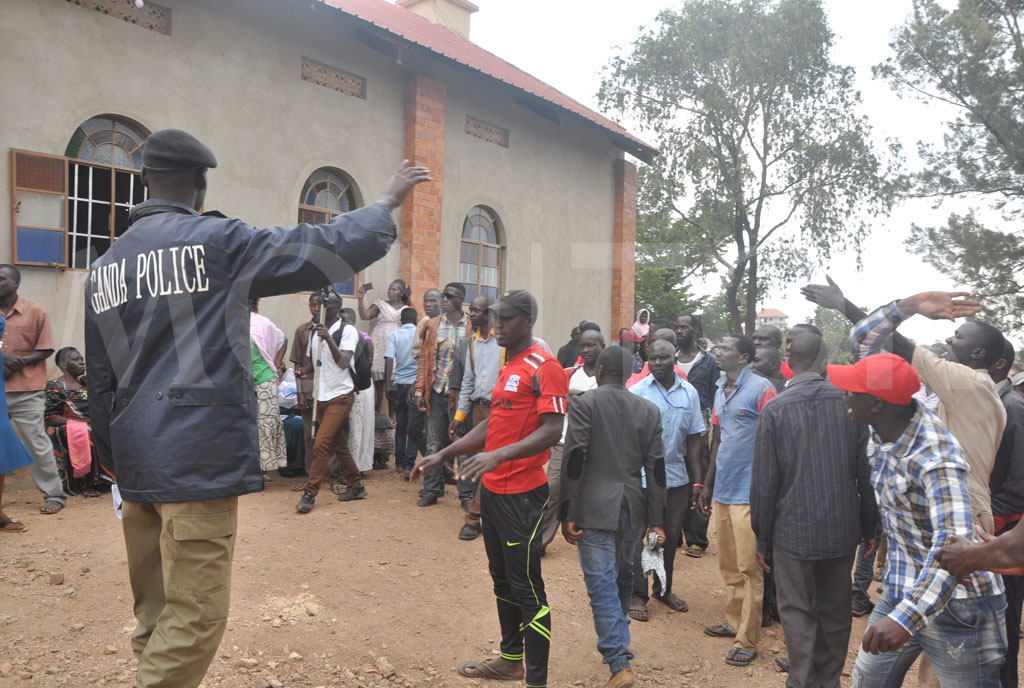Prime
Why govt deferred Local Council polls again

A policeman addresses rowdy residents after they did not appear on the voters’ register in Kisekende Village, Mubende District on July 10, 2018. PHOTO/JOSEPHINE NNABBAALE
What you need to know:
- The current Local Council officials were elected in 2018, 17 years after the preceding election.
Voters and interested contenders have to wait another six months for the Local Council One and Two chairpersons elections, after the government approved an extension of the tenure of current office holders.
Cabinet on December 18 passed the resolution which will take effect on January 6, 2024, citing administrative challenges.
Sources close to Electoral Commission, however, talked of discrepancies and inconsistencies in the number of villages and parishes where polls are to be conducted as a reason for the extension.
The five-year tenure of village and parish heads expired on July 10. However, the government extended their tenure after failing to hold polls citing budgetary constraints.
The extension, which also includes Women Councils whose tenure expired in August 2022, means polls will be conducted anywhere before July 3, 2024.
The State minister for Information and National Guidance, Mr Godfrey Kabyanga, told journalists the decision is meant to enable proper preparations for a clean election.
“Following the expiry of the term …Cabinet approved the extension of the term of office of Women Councils and Women Committees existing at the commencement of the National Women Councils (amendment of Schedules)…and the term of office of the administrative units (LC1 and LC II) from January 6, 2024 for a further period not exceeding 180 days,” Mr Kabyanga said
He added: “Elections are a sensitive thing. It can bring a lot of petitions if you are not ready. It is not necessarily money but other logistics and that is why we are postponing until we are ready.”
Harmonise differences
Mr Raphael Magyezi, the Local Government minister, said the six months will enable all government entities involved to harmonise the differences between his ministry, the Electoral Commission and the Ministry of Finance. He assured the country that there would be no legal or administrative disruptions as witnessed in July.
“It is true that we are yet to sort out the issue of gazetted or coded administrative units. We still have some bit of inconsistency between the ministry of Local Government, Electoral Commission and the Ministry of Finance. We still need a bit of time to harmonise the list of administrative units,” he said.
“I want to assure the country that we shall do that within the time. In the meantime, the LC1s and LC2s should continue doing their work without any hindrance, they are working in accordance with the law,” he added.
The EC, which organises all elections, indicates readiness to conduct the polls as soon as the line ministry has its house in order. According the Commission website, there are 10,595 parishes and 70,626 as of September 2020.
The current Local Council officials were elected in 2018, 17 years after the preceding election. At the time of the expiry of their term, the government failed to secure the necessary funds to bankroll the election of new leaders.
Consequently, Parliament in July approved the amendment of the third schedule of the Local Governments Act, granting the line minister powers to extend the term of local council leaders for a period not exceeding six months, at a time.
Stakeholders had in the past weeks raised concern over what was hindering the polls, even after the Ministry of Finance released Shs58b to facilitate the election, with some accusing the government of deliberately frustrating the processes.



